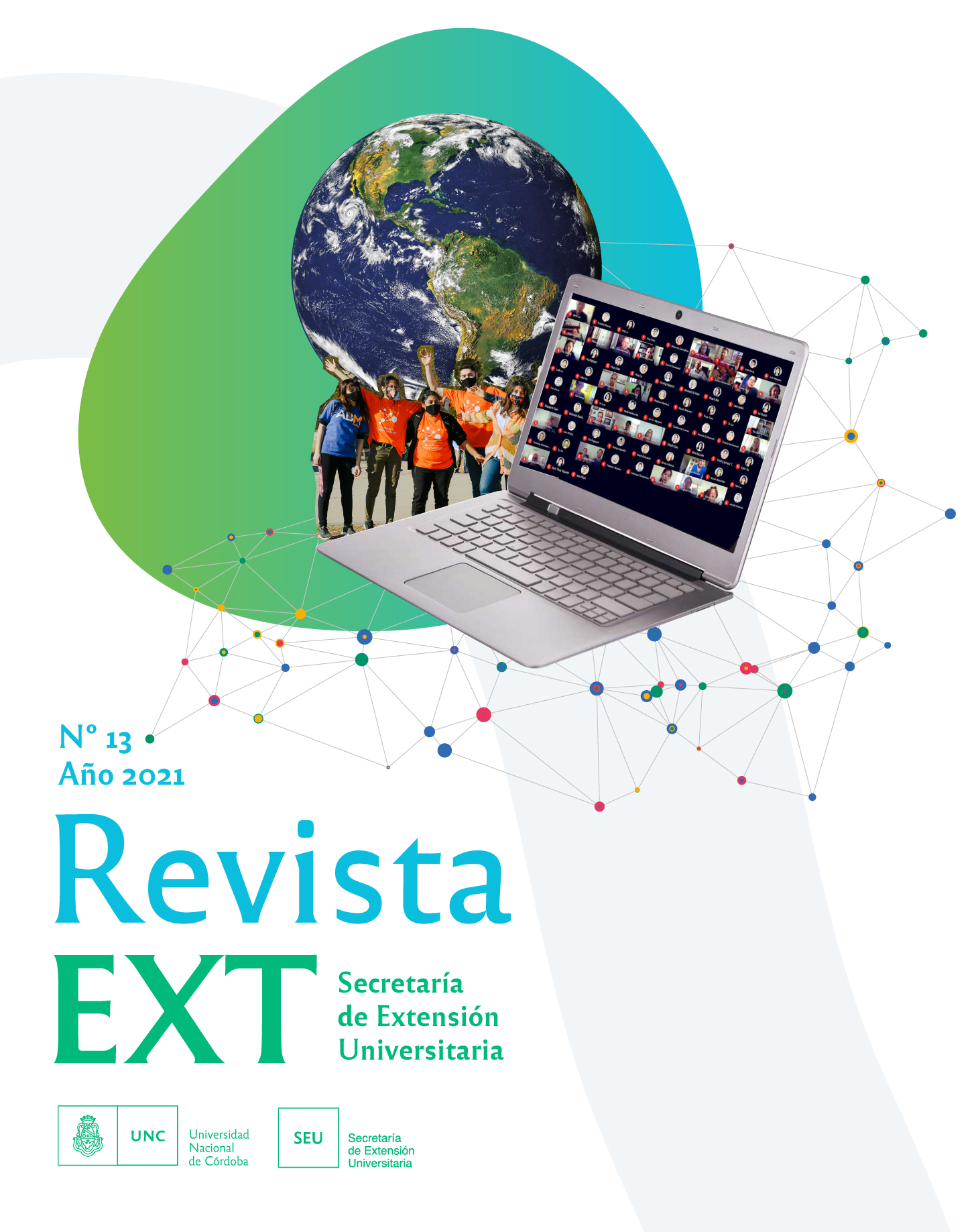Mujeres Consentimiento: la grupalidad y lo colectivo en la emergencia
Keywords:
groups ; isolation ; emergency ; community careAbstract
This article has the aim of providing reflections based on the outreach experience developed during the COVID-19 pandemic in the town of Unquillo, Córdoba. The work was done in the framework of the project "Mujeres CONsentimiento II: ensayos para una vida libre de violencias", which was carried out at the time when the national government decrees of "obligatory preventive social isolation" (OPSI) and later "obligatory preventive social distancing" (OPSD) were implemented and were in place from March 2020 to December due to the health emergency. The focus is on the scope of the OPSI and OPSD measures in the daily life of the population and the institutional functioning in general, and in particular in the territory where the intervention was implemented, leading to adjustments and revision of the original project. This article provides an account of the transformation of the project whose initial objectives were to reaffirm public space as a space for the expression of women from popular sectors and the strengthening of networks with community groups. Faced with a particular situation, containment strategies were developed that focused on accompanying reflective processes that would enable the building of cooperative relationships and generate solutions to emerging conflicts during the pandemic. Last, the focus was also on keeping the bonds with the network of local organisations and institutions that address the problem of violence.
Downloads
References
Aruguete, G. (2001). Redes sociales. Una propuesta organizacional alternativa. Trabajo presentado en la Jornada de Gestión de Organizaciones de la Sociedad Civil. Organizado por CEDES, UDESA y UTDT.
Bilavcik, C. (2019). Estrategia Teórica y metodológica de intervención grupal en los diferentes espacios y escenarios sociales desde el Trabajo Social. Ficha de cátedra “Teorías, espacios y estrategia de Intervención I B (Grupal). Carrera de Trabajo Social. Facultad de Ciencias Sociales.
Carballeda, A. (Margen). (abril de 2020). Reflexiones sobre el Trabajo Social en tiempos de pandemia [Archivo de video]. Buenos aires. https://www.youtube.com/watch?v=bsJRfsquDNc
Custo, E. (abril, 2011). “La grupalidad en Trabajo social: grupalidad e intervención en Trabajo Social”. Trabajo presentado en la “Primera Jornada: La intervención profesional en el campo grupal”. Universidad Nacional de Lujan Centro Regional General Sarmiento. Argentina.
González, P.; Yanes, A., (2013). Violencia contra las mujeres. Quien calla otorga. Buenas prácticas en intervención socio-sanitaria desde una perspectiva de género y derechos humanos. INCIHUSA CONICET. Recuperado de: http://www.catolicas.org.ar (Consulta: 01/08/18).
Lagarde, M. (2012). El feminismo en mi vida. Hitos, claves y topias. Recuperado de http:// www.inmujeres.df.gob.mx (consulta 06/08/2018).
Ley N° 26.485. Protección integral para prevenir, sancionar y erradicar la violencia contra las mujeres en los ámbitos en que se desarrollen sus relaciones interpersonales. Buenos Aires, Argentina. Recuperado de http: www.infoleg.gov.ar/infolegInternet/anexos/15000-154999/152155/norma.htm .
Maffía, D. (2020). Violencia de Genero: ¿La otra pandemia? En L. Siegrist, F. Escribal & N. Sosa (Comps.). El futuro después del COVID-19 (pp. 182-186). Buenos Aires. Argentina Futura. Recuperado de: https://www.argentina.gob.ar/sites/default/files/el_futuro_despues_del_covid-19.pdf
Menéndez, G. (27-11-2011). Los desafíos del presente y del futuro de la extensión universitaria. Revista +E, 1, 22-31. Recuperado de http://bibliotecavirtual.unl.edu.ar/publicaciones/index.php/Extension. (consulta 04/09/18), doi: httpps://doi.org/10.14409/extensión.v1i1.Ene-Dic.
Downloads
Published
Issue
Section
License

This work is licensed under a Creative Commons Attribution-NonCommercial-ShareAlike 4.0 International License.
Aquellos autores/as que tengan publicaciones con esta revista, aceptan los términos siguientes:
- Los autores/as conservarán sus derechos de autor y garantizarán a la revista el derecho de primera publicación de su obra, el cuál estará simultáneamente sujeto a la Licencia de reconocimiento de Creative Commons que permite a terceros compartir la obra siempre que se indique su autor y su primera publicación esta revista.
- Los autores/as podrán adoptar otros acuerdos de licencia no exclusiva de distribución de la versión de la obra publicada (p. ej.: depositarla en un archivo telemático institucional o publicarla en un volumen monográfico) siempre que se indique la publicación inicial en esta revista.
- Se permite y recomienda a los autores/as difundir su obra a través de Internet (p. ej.: en archivos telemáticos institucionales o en su página web) después del proceso de publicación, lo cual puede producir intercambios interesantes y aumentar las citas de la obra publicada. (Véase El efecto del acceso abierto).





